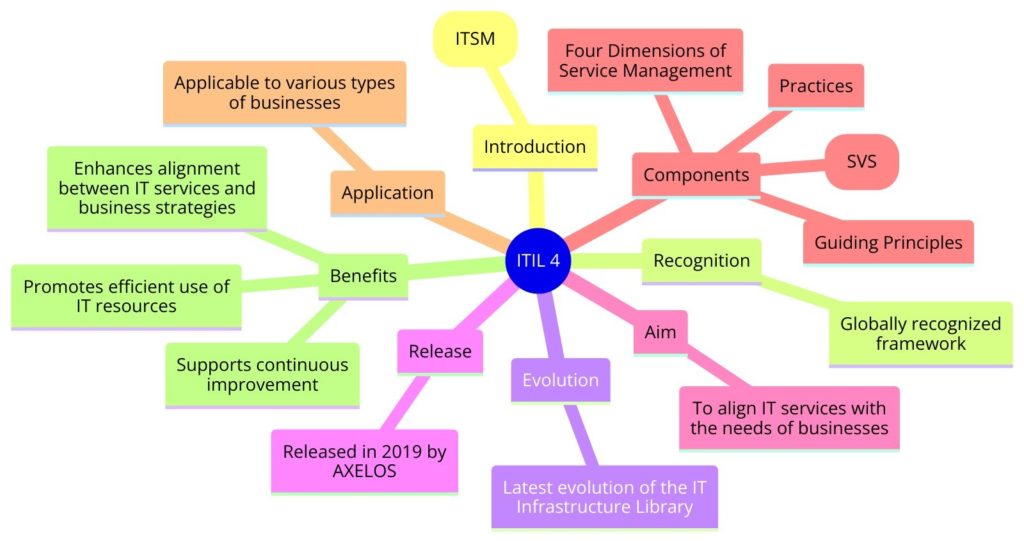ITIL
The IT Infrastructure Library (ITIL) is a globally recognized set of best practices for IT service management (ITSM) that aims to align IT services with the needs of businesses. ITIL 4, the latest evolution of this framework, was released in 2019 by AXELOS, a joint venture company formed by the UK Government and Capita PLC. ITIL 4 expands on the previous versions by introducing a holistic approach to service management, integrating concepts from lean IT, agile, and DevOps, and focusing more on customer experience, value streams, and digital transformation.
What is ITIL 4?
ITIL 4 provides a flexible and comprehensive framework for managing and delivering IT services. It is designed to help organizations navigate the complexities of the modern digital environment, enhance efficiency, and achieve business success through a service value system (SVS). The ITIL 4 framework encompasses the ITIL 4 Foundation and a series of specialized certifications that delve into various aspects of ITSM in depth.
Origin of the Framework
The ITIL framework was originally developed in the 1980s by the Central Computer and Telecommunications Agency (CCTA), a UK Government agency, to ensure better use of IT services and resources in government departments and later in the private sector. Over the years, ITIL has evolved through several versions, with ITIL 4 being the most recent, reflecting the latest trends in software development and IT operations.
How It Works
ITIL 4 introduces the concept of the Service Value System (SVS), which describes how all the components and activities of an organization work together to facilitate value creation through IT-enabled services. The core components of the ITIL 4 SVS include:
- The ITIL Service Value Chain: An operating model for the creation, delivery, and continual improvement of services.
- Practices: A set of organizational resources designed for performing work or accomplishing an objective.
- Guiding Principles: Recommendations that can guide an organization in all circumstances, regardless of changes in its goals, strategies, type of work, or management structure.
- Governance: The means by which an organization is directed and controlled.
- Continual Improvement: A recurring organizational activity performed at all levels to ensure that an organization’s performance continually meets stakeholders’ expectations.
Why It Is Valuable
ITIL 4 provides significant value to organizations by offering:
- Enhanced Alignment Between IT and Business: ITIL 4 helps ensure that IT services are closely aligned with the business’s current and future needs.
- Improved Service Delivery: It provides guidelines that can improve customer satisfaction through more professional service delivery.
- Efficiency and Productivity: ITIL 4 introduces practices that can help reduce costs, improve resource utilization, and streamline processes.
- Support for Digital Transformation: It supports organizations in their digital transformation journey by integrating principles from agile, DevOps, and lean methodologies.
When and How to Use It
Organizations can adopt ITIL 4 at any stage of their ITSM journey. It is particularly useful for organizations looking to:
- Improve IT service management practices.
- Align IT operations with business strategy.
- Enhance IT service delivery and customer satisfaction.
- Manage digital transformation and technological change effectively.
Implementing ITIL 4 involves:
- Gaining an understanding of the ITIL 4 framework through training and certification.
- Assessing the current state of ITSM practices within the organization.
- Developing a tailored implementation plan based on ITIL 4 principles and practices.
- Applying ITIL 4 practices incrementally, with a focus on continual improvement and adaptability to change.
Shortcomings/Criticisms
Despite its benefits, ITIL 4 has faced criticisms, including:
- Complexity: Newcomers may find the volume of material and the complexity of concepts daunting.
- Implementation Challenges: Successfully implementing ITIL 4 practices requires significant effort, cultural change, and buy-in from all levels of the organization.
- Cost: Training and certification can be expensive, especially for large teams.
ITIL 4 represents a significant evolution of the ITIL framework, providing a flexible and comprehensive guide for IT service management. By incorporating modern methodologies and focusing on creating value, ITIL 4 helps organizations meet the challenges of today’s fast-paced digital environment. While implementation can be complex and resource-intensive, the potential benefits in improved efficiency, alignment, and customer satisfaction make it a valuable investment for many organizations.


